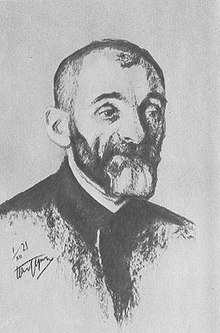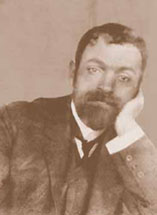Lev Shestov
Lev Shestov | |
|---|---|
| Died | November 19, 1938 (aged 72) |
| Era | 19th-century philosophy |
| Region | Russian philosophy Western philosophy |
| School | Christian existentialism |
Main interests | Theology, nihilism |
Notable ideas | Philosophy of despair |
Lev Isaakovich Shestov (
Shestov wrote extensively on philosophers such as
Life
Shestov was born Yeguda Leib Shvartsman in
Shestov's
He developed his thinking in a second book on
Shestov's works were not met with approval even by some of his closest Russian friends. Many saw in Shestov's work a renunciation of reason and metaphysics, and even an espousal of nihilism. Nevertheless, he would find admirers in such writers as D. H. Lawrence and his friend Georges Bataille.
In 1908 Shestov moved to

Shestov's dislike of the Soviet regime led him to undertake a long journey out of Russia, and he eventually ended up in France. The author was a popular figure in France, where his originality was quickly recognized. In Paris, he soon befriended, and much influenced, the young
The discovery of Kierkegaard prompted Shestov to realise that his philosophy shared great similarities, such as his rejection of
Despite his weakening condition Shestov continued to write at a quick pace, and finally completed his
In 1938, Shestov contracted a serious illness whilst at his vacation home. During this final period, he continued his studies, concentrating in particular on Indian philosophy as well as the works of his contemporary and friend Edmund Husserl, who had died recently. Shestov himself died at a clinic in Paris.
Philosophy

Shestov's philosophy is, at first sight, not a philosophy at all, or it is a kind of
Critique of reason
For Shestov, philosophy has employed
I know full well that Necessity reigns now… But who can prove to me that it has always been? That it was not something else before? Or that there will not be something else afterwards? It's up to men to side with Necessity, perhaps... But a philosopher must search for Sources - beyond Necessity, beyond Good and Evil.[14]
In Athens and Jerusalem, he states that, while men seek coherence in life,
Why attribute to God, the God whom neither time nor space limits, the same respect and love for order? Why forever speak of "total unity"? … There is no need at all. Consequently, the idea of total unity is an absolutely false idea. ... It is not forbidden for reason to speak of unity and even of unities, but it must renounce total unity - and other things besides. And what a sigh of relief men will breathe when they suddenly discover that the living God, the true God, in no way resembles Him whom reason has shown them until now!
Through this attack on "self-evident truths", Shestov implies that we are all seemingly alone with our experience and suffering, and cannot be helped by philosophical systems. Echoing
Despair as "the penultimate word"
Shestov's point of departure is not a theory, or an idea, but an experience, the experience of despair, which Shestov describes as the loss of certainties, the loss of freedom, the loss of the meaning of life. The root of this despair is what he frequently calls 'Necessity', but also 'Reason', 'Idealism' or 'Fate': a certain way of thinking (but at the same time also a very real aspect of the world) that subordinates life to ideas, abstractions, generalisations and thereby kills it, through an ignoring of the uniqueness and livingness of reality.
But despair is not the last word, it is only the 'penultimate word'. The last word cannot be said in human language, can't be captured in theory. His philosophy begins with despair, his whole thinking is desperate, but Shestov tries to point to something beyond despair - and beyond philosophy.
This is what he calls 'faith': not a belief, not a certainty, but another way of thinking that arises in the midst of the deepest doubt and insecurity. It is the experience that "everything is possible" (Dostoevsky), that the opposite of Necessity is not chance or accident, but possibility, that there does exist a god-given freedom without boundaries, without walls or borders:
Within the “limits of reason” one can create a science, a sublime ethic, and even a religion; but to find G-d one must tear oneself away from the seductions of reason with all its physical and moral constraints, and go to another source of truth. In Scripture this source bears the enigmatic name “faith,” which is that dimension of thought where truth abandons itself fearlessly and joyously to the entire disposition of the Creator.[15]
Furthermore, although a
"Cur Deus homo? Why, to what purpose, did He become man, expose himself to injurious mistreatment, ignominious and painful death on the cross? Was it not in order to show man, through His example, that no decision is too hard, that it is worth while bearing anything in order not to remain in the womb of the One? That any torture whatever to the living being is better than the 'bliss' of the rest-satiate 'ideal' being?"
Likewise, the final words of his last work, Athens and Jerusalem, are: "Philosophy is not Besinnen [think over] but struggle. And this struggle has no end and will have no end. The kingdom of God, as it is written, is attained through violence." (cf Matthew 11:12)
Influence
"When I give Shestov's books to anybody, they are usually delighted. There are two authors whom I make propaganda for: one is Herzen, the other is Shestov. They are both totally decent, open-minded, open-hearted human beings."
Shestov was highly admired and honored by Nikolai Berdyaev and Sergei Bulgakov in Russia, Jules de Gaultier, Georges Bataille, Lucien Lévy-Bruhl, Paul Celan, Gilles Deleuze, and Albert Camus in France, and D. H. Lawrence, Isaiah Berlin and John Middleton Murry in England. Among Jewish thinkers, he influenced Hillel Zeitlin.
Today, Shestov is little known in the English-speaking world. This is partly because his works have not been readily available. Partly the specific themes he discusses are unfashionable and "foreign". A sombre and yet ecstatic atmosphere permeates his writings. And his quasi-nihilistic position and religious outlook are an unsettling and incongruous combination, at first sight.
He did however influence writers such as Albert Camus (who wrote about him in Le Mythe de Sisyphe, The Myth of Sisyphus), Benjamin Fondane (his 'pupil'), the poet Paul Celan, and notably Emil Cioran, who writes about Shestov:
- "He was the philosopher of my generation, which didn't succeed in realizing itself spiritually, but remained nostalgic about such a realization. Shestov [...] has played an important role in my life. [...] He thought rightly that the true problems escape the philosophers. What else do they do but obscuring the real torments of life?" (Emil Cioran: Oeuvres, Gallimard, Paris 1995, p. 1740, my translation.)
Shestov also appears in the work of Gilles Deleuze; he is referred to sporadically in Nietzsche and Philosophy and also appears in Difference and Repetition.
Leo Strauss wrote "Jerusalem and Athens" in part as a response to Shestov's "Athens and Jerusalem".
More recently, alongside Dostoyevsky's philosophy, many have found solace in Shestov's battle against the rational self-consistent and self-evident; for example Bernard Martin of Case Western Reserve University, who translated his works now found online [external link below]; and the scholar Liza Knapp,[17] who wrote The Annihilation of Inertia: Dostoevsky and Metaphysics. This book was an evaluation of Dostoyevsky's struggle against the self-evident "wall", and refers to Shestov on several occasions.
According to Michael Richardson's research on Georges Bataille, Shestov was an early influence on Bataille and was responsible for exposing him to Nietzsche. He argues that Shestov's radical views on theology and an interest in extreme human behavior probably coloured Bataille's own thoughts.
Main works
These are Shestov's most important works, in their English translations, and with their date of writing:
- The Good in the Teaching of Tolstoy and Nietzsche, 1899.
- The Philosophy of Tragedy, Dostoevsky and Nietzsche, 1903.
- All Things are Possible (Apotheosis of Groundlessness), 1905.
- By Faith Alone, written 1910-14.
- English translation: By Faith Alone: The Medieval Church and Martin Luther (2023). Translated by Stephen P. Van Trees. London & New York: Bloomsbury Academic. ISBN 978-1350362314.
- Potestas Clavium, 1919.
- In Job's Balances, 1923–29.
- Kierkegaard and the Existential Philosophy, 1933–34.
- Athens and Jerusalem, 1930–37.
- English second edition: Athens & Jerusalem (2016). Translated by Bernard Martin, edited by Ramona Fotiade. Athens, Ohio: Ohio University Press. ISBN 978-0821422199.
Notes
References
- ^ a b Martin, Bernard, Introduction to "Athens and Jerusalem"
- ^ a b Sugarman, David (11 June 2012). "A Philosopher of Small Things". Tablet. Retrieved 30 January 2022.
- .
- ^ Mullarky, John (28 August 2012). "Reviews: Boris Groys, Introduction to Antiphilosophy". Notre Dame Philosophical Review. Retrieved 10 February 2022.
- ISBN 1-55849-531-2.
- ISBN 978-5-458-24845-7.
- ^ 'All Things Are Possible', Koteliansky Translation (1920 / Secker, London).
- ^ 'Foreword' to 'All Things Are Possible' by D. H. Lawrence (1920).
- ^ 'Introduction' to 'All Things Are Possible' by Prof. Edouard d'Araille (2001/LTP Ed.).
- ISBN 978-1-4438-2644-0.
- ^ "Czeslaw Milosz - Shestov or the Purity of Despair". shestov.phonoarchive.org. Retrieved 2022-07-21.
- ^ S2CID 152315214.
- ^ Shestov, Lev (1937). Athens and Jerusalem. p. 19.
- ^ Fondane, Benjamin (1982). Rencontres avec Léon Chestov. Paris: Plasma.
- ^ Shestov, Lev (1937). Athens and Jerusalem. p. 18.
- ^ Ramin Jahanbegloo, Conversations with Isaiah Berlin (London 2000), pp. 201–2
- ^ Liza Knapp, "The Force of Inertia in Dostoevsky's 'Krotkaja'" Archived 2013-11-01 at the Wayback Machine, Dostoevsky Studies, Vol. 6 (1985), pp. 144–57
Further reading
- Ramona Fotiade: "The Meaning of Life and the Critique of Scientific Knowledge", in Emerson, Pattison and Poole (eds.), The Oxford Handbook of Russian Religious Thought, Oxford: OUP, 2020, pp. 464–79.
- (in French) Geneviève Piron : Léon Chestov, philosophe du déracinement, Éditions L'Âge d'Homme, 2010 (ISBN 978-2-8251-3976-9).
- Ramona Fotiade: Léon Chestov 1866-1938 La Pensée du dehors, Société d'Études Leon Chestov/ Le Bruit du Temps, 2016 (ISBN 978-2-3587-3100-3)
External links
- Works by Lev Shestov at Project Gutenberg
- Works by Lev Shestov at LibriVox (public domain audiobooks)

- Gregory B Sadler, Existentialism: Lev Shestov, "The Theory of Knowledge on YouTube
- Gregory B Sadler, Existentialism: Lev Shestov, All Things are Possible (part 1) on YouTube
- Gregory B Sadler, Existentialism: Lev Shestov, All Things are Possible (part 2) on YouTube
- Gregory B Sadler, Existentialism: Lev Shestov, All Things are Possible (part 3) on YouTube
- The Lev Shestov Society homepage
- Martin, Bernard (1966). Lev Shestov - Introduction. Retrieved 2 January 2006.
- Lev Shestov in English (formerly hosted at shestov.by.ru)
